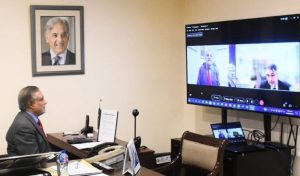Discussions with the IMF came to an end with no “breakthrough.”
The ministry of finance reports that both parties highlighted the “challenges to regional economies in the context of climate change.”

ISLAMABAD: Despite both sides describing their first face-to-face meeting in four months as “positive,” Pakistan and the International Monetary Fund (IMF) did not announce a breakthrough in their negotiations on Monday, as was clear from the fact that no date for the mission’s crucial visit to Islamabad was announced.
The meeting’s goal was to come to an agreement on the steps that would guarantee the talks for the 9th programme review. Ishaq Dar, the finance minister, and Nathan Porter, the head of the IMF mission, surprisingly, “addressed challenges to regional economies in the face of climate change,” according to a tweet from the finance ministry.
The Express Tribune was informed by sources in Geneva that Pakistan would need to take specific actions before the IMF dispatched a staff-level delegation. The IMF delegation was scheduled to visit Pakistan for programme negotiations in three days, as stated in last week’s announcement by Prime Minister Shehbaz Sharif, but that time frame has already gone.
According to the finance ministry, Dar and Porter met during the International Conference on Climate Resilient Pakistan in Geneva. They also “addressed challenges to regional economies” as a result of climate change, it was stated. It stated that “the finance minister reiterated the resolve to finish the Fund programme.”
Dar was not supported at the IMF negotiations by anyone from the finance ministry. Instead, Economic Affairs Secretary Kazim Niaz and Economic Affairs Minister Sardar Ayaz Sadiq were present. The IMF is the focus of the Finance Division according to the business’s rules.
Thanos Arvanitis, the deputy head of the IMF’s Middle East and Central Asia department, was quoted by Reuters as stating, “I do not have any pronouncements to make, but it was a good meeting.”
The IMF team would soon visit Pakistan, according to a Pakistani representative, but Pakistan would need to demonstrate progress on issues that had already been discussed. According to a person familiar with the conversations, “The IMF team does not make any fresh demands.”
A presidential ordinance to impose taxes is already being promulgated by the administration. The Federal Board of Revenue (FBR) experienced a tax shortfall of Rs218 billion in December.
Due to disagreements over the power tariff, exchange rate policies, and a significant deficit in the fiscal framework, the IMF halted the disbursement of a loan tranche worth $1.1 billion. Last week, the total official foreign exchange reserves fell to a nine-year low of $4.5 billion, which is sufficient to cover imports for three weeks.
Last Monday, the finance minister said that Pakistan also had the reserves of over $6 billion in private commercial banks. However, out of the $5.8 billion held by commercial banks as of November 30, 2022, the central bank had already borrowed $5 billion.
The UK urged Pakistan to complete the ninth review of the IMF programme and carry out its macroeconomic reforms. It would be far simpler for the world to assist Pakistan, according to UK Development Secretary Andrew Mitchell, “if Pakistani taxpayers are perceived to be playing a vital part in this endeavour.”
The Pakistan Mulsim League-Nawaz (PML-N)-led government, in contrast, provided the traders, a key constituency, tax breaks worth Rs40 billion.
After the first session, Prime Minister Shehbaz Sharif addressed the media and requested that the IMF hold off on its demands for economic changes. Shehbaz claimed he was attempting to convince the IMF to grant Islamabad some breathing room as it dealt with the “nightmarish” circumstance.
The prime minister remarked that “we were already confronting huge issues even before these floods hit Pakistan.” Pakistan was attempting to resurrect the programme, he added. He emphasised that Pakistan was adhering to the IMF’s requirements “as best as possible,” but he questioned how on earth the poorest citizens of the nation could bear the increased weight.
“However, we remain dedicated to the IMF’s agenda. We will make every effort to abide with the rules and regulations. Even if I keep pleading with them, “Please give us a break,” he added. The prime minister concluded by stating that Pakistan would adhere to the IMF programme.










































